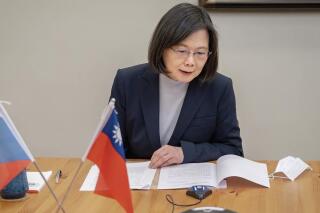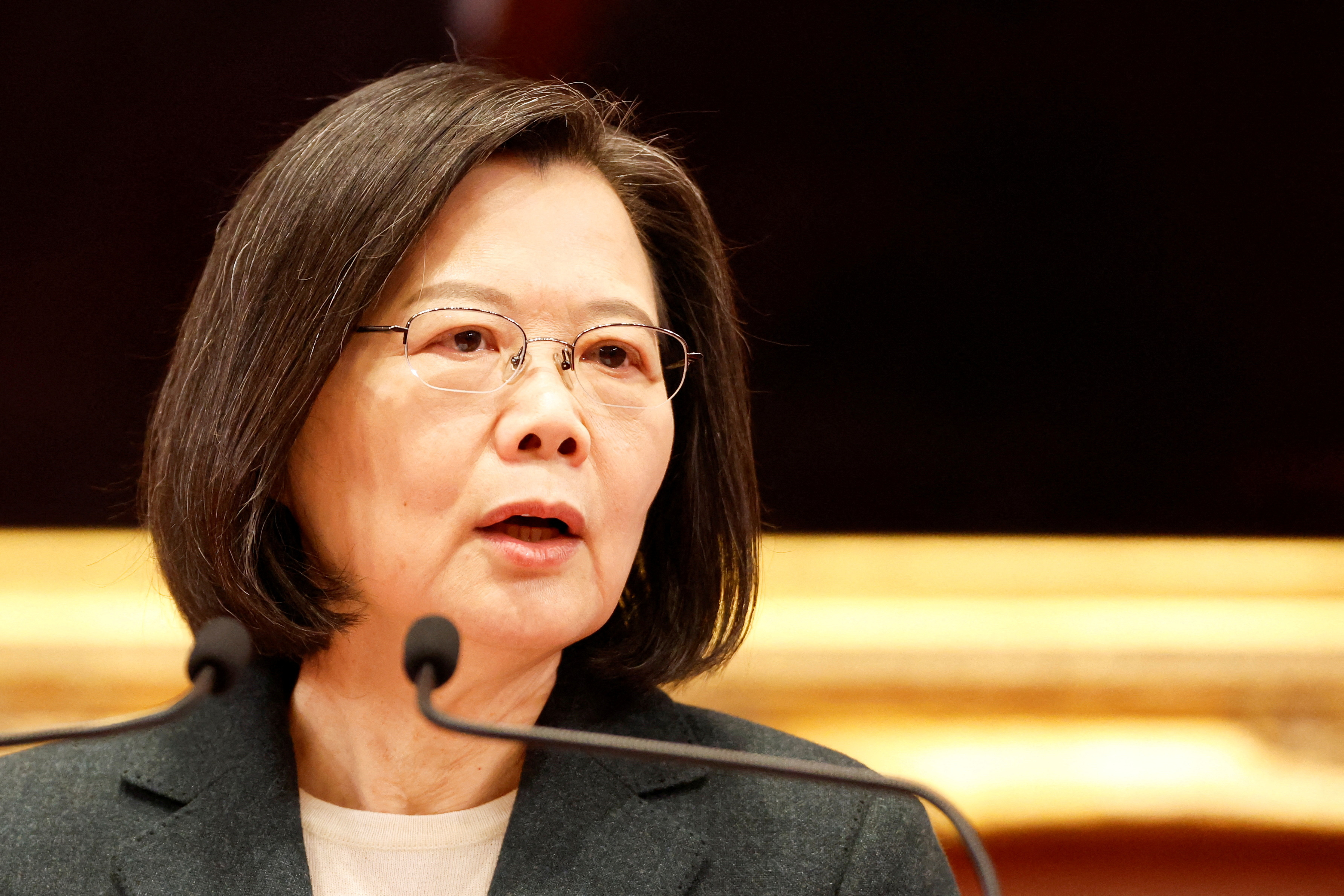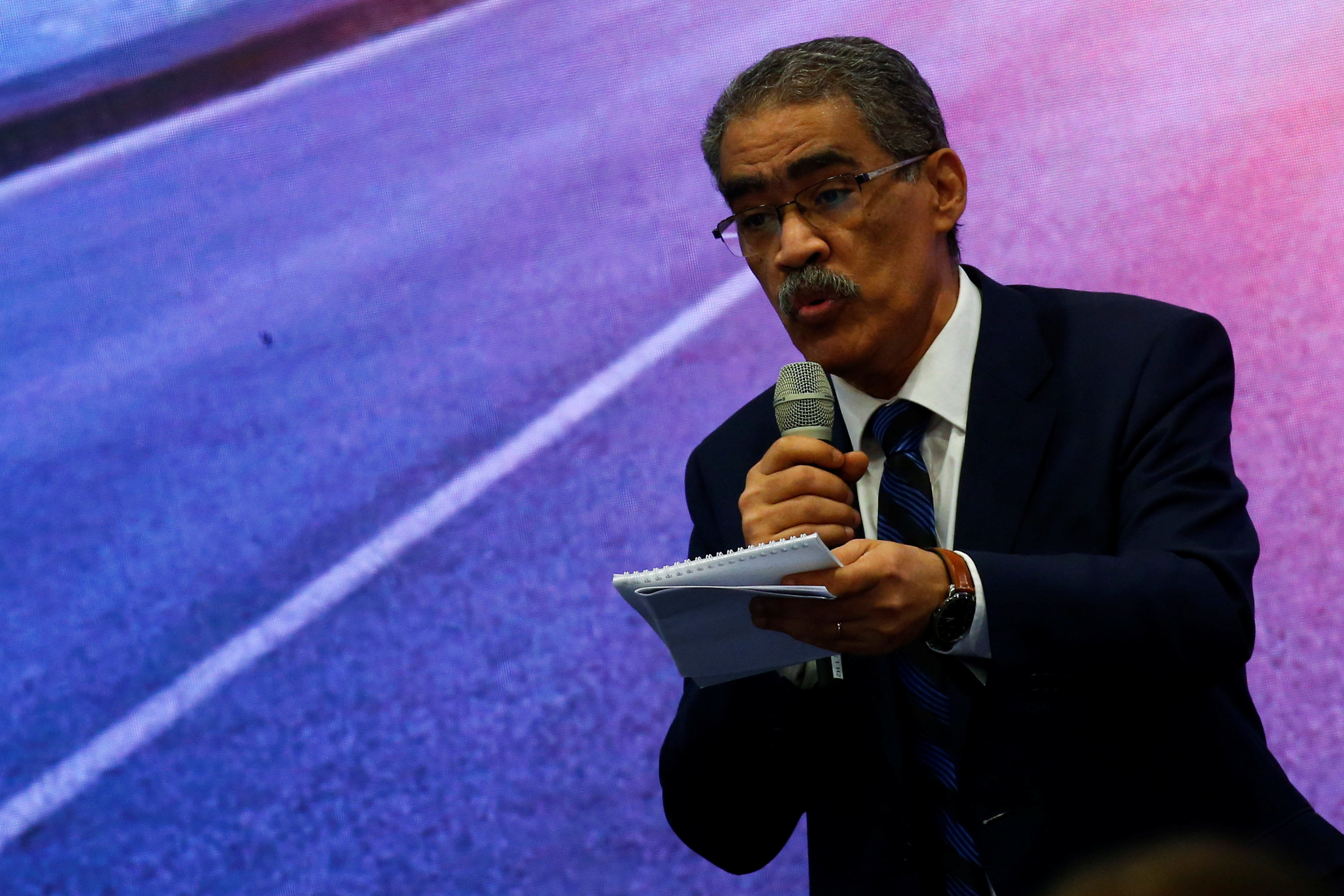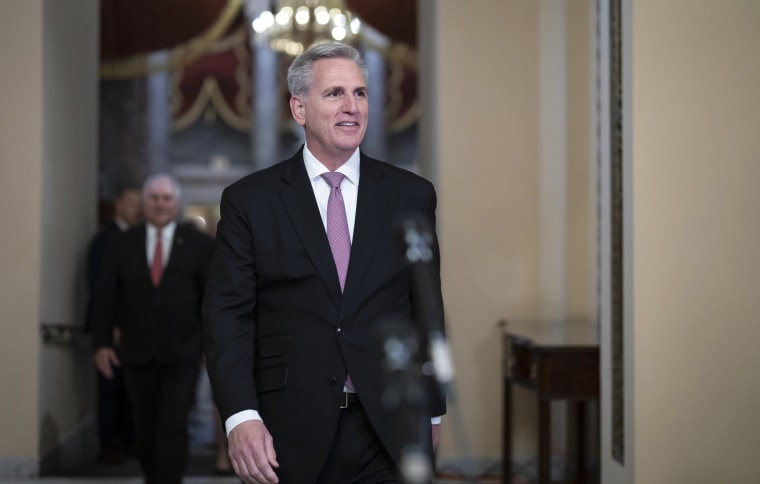- Skip to main content
- Keyboard shortcuts for audio player

Taiwan's president arrives in the U.S. amid warnings from China

John Ruwitch

Taiwan's President Tsai Ing-wen leaves a hotel in New York, Wednesday, March 29, 2023. Yuki Iwamura/AP hide caption
Taiwan's President Tsai Ing-wen leaves a hotel in New York, Wednesday, March 29, 2023.
TAIPEI, Taiwan – Taiwan's president, Tsai Ing-wen, is in the United States as part of a multi-day itinerary that will take the leader of the Asian democratic island through Central and North America, a trip that China is closely watching.
"External pressure will not hinder our determination to go to the world. We are calm and confident, will neither yield nor provoke," Tsai told reporters on Tuesday right before departing from Taipei.
Her carefully choreographed trip comes at a tense moment for Taiwan. Last week, Honduras, once one of the few remaining countries which formally recognized Taiwan's government, formally switched ties to Beijing. Tsai next heads to Belize and Guatemala, both of which still have formal ties with Taipei.
Why China is reasserting its right of control over Taiwan
On the way back to Taiwan next week, Tsai is set to stop in Los Angeles and meet House Speaker Kevin McCarthy at the Ronald Reagan Presidential Library.
Beijing, which considers Taiwan part of its territory and opposes interactions between Taiwan and other state officials, has already signaled its unhappiness.
If Tsai meets McCarthy, China would consider that "another provocation that seriously violates the one-China principle, harms China's sovereignty and territorial integrity," a spokesperson for China's Taiwan Affairs Office, Zhu Fenglian, told reporters this week.
China, Zhu added, "firmly opposes this and will definitely take measures to resolutely fight back."
China has not specified how it intends to retaliate, but last summer, after former speaker Nancy Pelosi visited Taiwan, Beijing staged unprecedented military drills around the island and cut off dialogue with the U.S. across a range of policy topics, including environmental dialogue and cooperation on cracking down on fentanyl trafficking.
"It feels like everybody realizes we got really close to something really bad. We need to be more cautious," says Shelley Rigger , a Taiwan expert and professor of Asian studies at Davidson College.
McCarthy originally expressed interest in visiting Tsai in Taipei, but moving that meeting to California was a compromise, given the political risks to Taiwan, says Rigger: "[Tsai] is trying to keep McCarthy in North America, and that is a big concession."
Both Taipei and Washington are treading a careful line with Tsai's current trip. Tsai's U.S. stops are not being called visits. Tsai's office has stressed she is stopping in the U.S. as a private individual, and American officials are calling them transits, albeit ones that will last several days.
These stops are not new, however. Tsai has visited the U.S. nearly every year as president (with a three-year pause during the global coronavirus pandemic), despite Beijing's efforts to limit Taiwan's space on the international stage.
Tsai's dates in the U.S. align with a trip to China by former Taiwan president Ma Ying-jeoh, who is currently touring the mainland for the first time, on a trip billed as a cultural and academic exchange. Ma's foundation said that the timing of his trip was not planned to coincide with Tsai's, but it has in practice acted as a political counterweight to Tsai's stops in the U.S.
"People on both sides of the Taiwan Strait are Chinese people," Ma told reporters this week, using wording to denote Chinese ethnicity, not nationality.
- Share full article
Advertisement
Supported by
As a Taiwanese Presidential Contender Visits U.S., He Tries to Walk a Fine Line
An outspoken critic of Beijing, Lai Ching-te aims to reassure voters and Washington that he will be a safe pair of hands if elected.

By Amy Chang Chien and Chris Buckley
Reporting from Taipei
Vice President Lai Ching-te of Taiwan rose to prominence as a pugnacious opponent of Beijing’s claims over the island. But now, as a leading candidate in Taiwan’s presidential race, he is likely to present a more muted persona when he visits the United States starting Saturday. Expect restraint, not rousing speeches, Taiwanese officials and scholars say.
Nonetheless, his stops in New York and San Francisco will be closely watched — in Taiwan, in Beijing and in Washington — for clues to how he might handle crucial relations with the United States and China as president, a top issue in Taiwan’s intense presidential race. And his visit, however low-key, is also likely to prompt an escalation of Chinese military flights and naval maneuvers near Taiwan, bringing into focus the risks of real conflict over its future.
“Even without such special political events, there’s actually been quite a high level of harassment of Taiwan by People’s Liberation Army planes this year,” said Shu Hsiao-huang , a researcher at Taiwan’s Institute for National Defense and Security Research, a government-funded body in Taipei. “The People’s Liberation Army would never let a major foreign policy event like this slip by.”
Mr. Lai, 63, a former doctor who uses the name William, emerged from a wing of his Democratic Progressive Party that has pressed Taiwan’s aspirations for fully exercising sovereignty, and he has previously called himself a “pragmatic worker for Taiwanese independence.”
But as Mr. Lai vies to succeed President Tsai Ing-wen, who has a determinedly buttoned-down manner , he is also seeking to assure Taiwanese voters, and probably Washington, that he can be a steady pair of hands. In a brief statement at the airport before leaving, Mr. Lai said he would use his visit to Paraguay — one of only 13 states that retains formal diplomatic relations with Taiwan — to promote his island democracy’s global role, and he mentioned his brief stay in New York only in passing.
His visit, he said, would “let the international community know that Taiwan is a country that upholds democracy, freedom and human rights, and also let the international community know about all our efforts to maintain peace and stability in the Indo-Pacific.”
Beijing regards Taiwan as Chinese territory, and as its military strength has grown, so have fears that it could try to impose unification by force. Taiwan’s partnership with Washington has become central to deterring that possibility. Most Taiwanese voters desire neither unification nor open conflict with China, and the Biden administration also says that it wants to maintain the current ambiguous status quo , with no surprise shifts by Beijing or by Taipei.
“Lai wants to reassure the United States and its allies,” said Lu Yeh-Chung , a professor of diplomacy at National Chengchi University in Taipei. “He wants everyone to know that he is not a troublemaker.”
Mr. Lai has no plans for major speeches or meetings with prominent members of Congress, said two Taiwanese officials close to Mr. Lai. (Meetings with senior members of U.S. presidential administrations do not happen even for Taiwanese presidents.) Both officials spoke on condition of anonymity to describe the internal plans. Mr. Lai will meet members of the Taiwanese-American community and give remarks at a lunch in New York, and a similar community event is likely to take place in San Francisco, one said.
Though the United States severed formal diplomatic ties with Taiwan in 1979, it lets its leaders make transit visits. Mr. Lai’s travel plans reflect the more modest protocol that comes with being a vice president, said the Taiwanese officials. But that lower key also fit with Mr. Lai’s political goals, they said.
“He travels to the U.S. as a presidential candidate to send a message that he is ready,” said Sung Cheng-en, a scholar of international law at the Taiwan New Constitution Foundation , a think tank that is aligned with Mr. Lai’s ruling party. “He wants to convey a message that he is stable and reliable, whether that’s during the election campaign or for his international role.”
But the Chinese government is likely to seize on Mr. Lai’s trip to stage a show of military force near Taiwan, several experts said. Beijing is trying to curtail Taiwan’s international contacts, and Chinese leaders nurse a special loathing for the Democratic Progressive Party, which seeks to assert Taiwan’s separateness from China, a position that Beijing says is tantamount to seeking outright independence.
After Nancy Pelosi, then the speaker of the United States House of Representatives, visited Taiwan last August , China’s military held a week of exercises around the island. China also held days of exercises in April after Ms. Tsai visited the United States on her way to and from Latin America, and met the current Speaker, Kevin McCarthy, in California.
Competing factors will weigh on how intense Chinese retaliation is this time. Beijing hopes that Mr. Lai’s party loses the presidential election in January, and has long leaned to the Nationalist Party, which favors expanded contacts with China. Menacing exercises around Taiwan could hurt Nationalist chances by provoking a backlash among voters.
But Xi Jinping, China’s top leader, is unlikely to let Mr. Lai’s stopovers go unnoticed and risk being seen as weak. Chinese military flights near Taiwan have increased markedly since Ms. Pelosi’s visit. Beijing has already issued a stream of denunciations of Mr. Lai’s trip. Chinese maritime authorities also announced that starting on Saturday three days of military exercises would be held in seas more than 300 miles north of Taiwan.
“Lai Ching-te clings stubbornly to the separatist position for ‘Taiwan independence.’ He is a troublemaker through and through,” the Chinese Ministry of Foreign Affairs said in a statement issued on Sunday about his visit. “China is closely following the developments of the situation and will take resolute and strong measures to safeguard its sovereignty and territorial integrity.”
Mr. Lai will spend Sunday in New York, and then fly to Paraguay to attend the inauguration of president-elect Santiago Peña, according to a schedule issued by the Taiwanese government. En route back to Taiwan, Mr. Lai will spend an evening and part of a day in San Francisco. On Saturday night in New York, a festive crowd of hundreds of supporters gathered to greet him at his hotel, chanting “Go Taiwan” and “Go Vice President Lai.”
Mr. Lai has sought to douse anxieties that he would pursue drastic changes in Taiwan’s status if elected. He has said that his comments about being a “pragmatic worker for Taiwanese independence” just meant that he wanted to more fully exercise Taiwan’s current sovereignty.
Yet he has also sought to promote his government’s ties with the United States as an election asset, while accusing his opponents of gullibility about China. They reject that characterization and argue that Mr. Lai would be a risky choice.
“This election is a choice between Zhongnanhai and the White House,” Mr. Lai told supporters last month , referring to the Chinese Communist Party headquarters in Beijing. “When we can go to the White House — when the Taiwanese president can enter the White House — we’ll have reached the political goal that we’re pursuing.”
His comments prompted requests for clarification from U.S. officials, the Financial Times reported .
Mr. Lai is so far leading most polls. He is competing against Ko Wen-je, former mayor of Taipei, who is heading an insurgent campaign drawing on discontent with the established parties, and Hou Yu-ih , the candidate for the Nationalists, who so far has lagged in most polls.
“There is some trepidation about the pending change in Taiwan’s leadership,” said Bonnie S. Glaser , who is an expert on Taiwan and managing director of the Indo-Pacific program for the German Marshall Fund. “While the U.S. will work with whoever is elected president, the transition is fraught with uncertainty and risk, whichever candidate wins.”
Amy Chang Chien covers news in mainland China and Taiwan. She is based in Taipei. More about Amy Chang Chien
Chris Buckley is The Times’s chief correspondent in China, where he has lived for most of the past 30 years after growing up in Sydney, Australia. Before joining The Times in 2012, he was a correspondent in Beijing for Reuters. More about Chris Buckley
- Election 2024
- Entertainment
- Newsletters
- Photography
- Personal Finance
- AP Investigations
- AP Buyline Personal Finance
- AP Buyline Shopping
- Press Releases
- Israel-Hamas War
- Russia-Ukraine War
- Global elections
- Asia Pacific
- Latin America
- Middle East
- Election Results
- Delegate Tracker
- AP & Elections
- Auto Racing
- 2024 Paris Olympic Games
- Movie reviews
- Book reviews
- Personal finance
- Financial Markets
- Business Highlights
- Financial wellness
- Artificial Intelligence
- Social Media
US: No reason for China to react to Taiwan leader stopover

In this photo released by the Taiwan Presidential Office, Taiwan’s President Tsai Ing-wen speaks by phone with the Czech Republic’s President elect Petr Pavel in Taipei, Taiwan, Jan. 30, 2023. The Biden administration has been stressing to Beijing that an expected unofficial visit to the United States by Taiwan President Tsai Ing-wen should not be used as pretext by Beijing to step up aggressive activity in the Taiwan Strait.(Taiwan Presidential Office via AP)
- Copy Link copied
WASHINGTON (AP) — The Biden administration is putting out the word that planned stopovers in the United States by Taiwan President Tsai Ing-wen in the coming weeks fall in line with recent precedent and should not be used as a pretext by China to step up aggressive activity in the Taiwan Strait.
Taiwan’s office of the president confirmed on Tuesday that Tsai is tentatively scheduled to transit through New York on March 30 before heading to Guatemala and Belize. She’s expected to stop in Los Angeles on April 5 on her way back to Taiwan. The office did not provide details of her itinerary while in the U.S.
Ahead of Taiwan’s announcement, senior U.S. officials in Washington and Beijing have underscored to their Chinese counterparts in recent weeks that transit visits through the United States during broader international travel by the Taiwanese president have been routine over the years, according to a senior administration official. The official spoke on the condition of anonymity to discuss the sensitive matter.
In such unofficial visits in recent years, Tsai has met with members of Congress and the Taiwanese diaspora and has been welcomed by the chairperson of the American Institute in Taiwan, the U.S. government-run nonprofit that carries out unofficial relations with Taiwan. White House National Security Council spokesman John Kirby said the planned stopovers—administration officials stress they are not official visits—are “business as usual” and consistent with longstanding U.S. policy.
“There’s no reason for China to overreact,” Kirby said about the expected unofficial visit. “Heck, there’s no reason for China to react.”
Tsai transited through the United States six times between 2016 and 2019 before slowing international travel with the coronavirus pandemic. In reaction to those visits, China rhetorically lashed out against the U.S. and Taiwan.
State Department deputy spokesman Vedant Patel said “the unofficial nature of our relations with Taiwan remains unchanged.”
The Biden administration is trying to avoid a replay of the heavy-handed response by China that came after then-House Speaker Nancy Pelosi visited Taiwan last year.
Following Pelosi’s August visit, Beijing launched missiles over Taiwan, deployed warships across the median line of the Taiwan Strait and carried out military exercises near the island. Beijing also suspended climate talks with the U.S. and restricted military-to-military communication with the Pentagon.
House Speaker Kevin McCarthy, a California Republican, has said he would meet with Tsai when she is in the U.S. and has not ruled out the possibility of traveling to Taiwan in a show of support.
Beijing sees official American contact with Taiwan as encouragement to make the island’s decades-old de facto independence permanent, a step U.S. leaders say they don’t support. Pelosi, D-Calif., was the highest-ranking elected American official to visit the island since Speaker Newt Gingrich in 1997. Under the “one China” policy , the U.S. recognizes Beijing as the government of China and doesn’t have diplomatic relations with Taiwan but has maintained that Taipei is an important partner in the Indo-Pacific.
U.S. officials are increasingly worried about China’s long-stated goals of unifying Taiwan with the mainland and the possibility of war over Taiwan. The self-ruled island democracy is claimed by Beijing as part of its territory. The 1979 Taiwan Relations Act, which has governed U.S. relations with the island, does not require the U.S. to step in militarily if China invades but makes it American policy to ensure Taiwan has the resources to defend itself and to prevent any unilateral change of status by Beijing.
The difficult U.S.-China relationship has only become more complicated since Pelosi’s visit.
Last month, President Joe Biden ordered a Chinese spy balloon shot out of the sky after it traversed the continental United States. And the Biden administration in recent weeks has said that U.S. intelligence findings show that China is weighing sending arms to Russia for its ongoing war in Ukraine , but it does not have evidence that suggests Beijing has decided to follow through on supplying Moscow.
The Biden administration postponed a planned visit to Beijing by Secretary of State Antony Blinken following the balloon controversy but has signaled it would like to get such a visit back on track.
The White House on Monday also said officials are in talks with China about possible visits by Treasury Secretary Janet Yellen and Commerce Secretary Gina Raimondo focused on economic matters. Biden has also said he expects to soon hold a call with China’s Xi Jinping.
Kirby said “keeping those lines of communication open” is still valuable.
Presidents Vladimir Putin and Xi met in Moscow on Tuesday for a second day of talks, the first face-to-face meeting between the allies since before Russia launched its Ukraine invasion more than a year ago.
The Taiwanese government earlier this month said that Tsai planned stops in New York and Southern California during an upcoming broader international trip.
AP journalists Johnson Lai in Taipei and Josh Boak and Matthew Lee in Washington contributed reporting.
This story has been corrected to show China lashed out against the U.S., not against China.

Taiwan’s new president inherits political gridlock at home
T AIPEI, Taiwan — In a campaign ad for Taiwan’s President-elect Lai Ching-te, incumbent President Tsai Ing-wen was shown driving with Lai in the passenger seat, exchanging reflections on their years governing together. Tsai later turned over the driving to Lai, who was joined by running mate Bi-khim Hsiao.
The message was clear: Lai would steer the island in the direction set by Tsai, who after eight years in power was barred from running again.
Lai, 64, will take office Monday. Continuing Tsai’s legacy means aiming to strike a balance between cultivating Taiwan’s unofficial alliance with the United States and maintaining peace with China, which claims Taiwan as its own territory, to be retaken by force if necessary.
Lai is also expected to build on some of Tsai’s domestic reforms, despite political gridlock. Lai and Tsai’s Democratic Progressive Party has lost the majority in the legislature, making it hard for Lai to push through legislation, including the approval of crucial national defense budgets.
Tsai, 67, has been Taiwan’s first female president and one of Asia’s few female leaders who didn’t hail from a political dynasty. Her legacy will be tied to defending the island’s sovereignty from China while refashioning it as a credible partner for the U.S. and other democracies. She will also be remembered for overseeing the legalization of same sex-marriage , steering Taiwan through the Covid years and kickstarting the island’s military modernization.
She leaves office with high approval ratings. A recent poll by broadcaster TVBS showed 42% of respondents were satisfied with her eight-year performance. Her predecessor, Ma Ying-jeou, left office with approval ratings of around 23%.
Tsai’s popularity partly reflects a shift in Taiwan’s identity. A vast majority of residents now identify as Taiwanese as opposed to Chinese and want to be governed separately from Beijing. Taiwan and China have had different governments since a civil war in 1949 saw the Nationalists flee to the island while China’s Communist Party took control of the mainland.
Tsai veered from the more China-friendly policies of the previous ruling party, the Kuomintang. By the end of Ma’s tenure, the frequent exchanges with Beijing were making many Taiwanese nervous, said Shelley Rigger, a Taiwan expert at Davidson College.
Beijing called Tsai a separatist after she refused to acknowledge the 1992 Consensus, an agreement which says Taiwan is part of “One China.” While pulling away from Beijing, however, Tsai left a door open for communication.
“President Tsai has always said that Taiwan, under her leadership, is happy, willing and eager to have dialogue with Beijing, just not on terms unilaterally imposed by Beijing,” said Wen-Ti Sung, a fellow with Washington-based think tank Atlantic Council.
China has not only declined to speak to Tsai but also ramped up military and economic pressure on the island, sending warships and military jets near it daily.
Beijing prevents countries it has diplomatic relations with from having formal ties with Taipei. During Tsai’s tenure, it intensified a campaign to lure away the island’s few diplomatic partners. During Tsai’s years in office, China poached almost half of Taiwan’s diplomatic allies, bringing the remaining number to 12.
Tsai pushed back by diversifying trade relationships and increasing military spending including submarine development. She also elevated Taiwan’s standing on the international stage, said outgoing Foreign Minister Joseph Wu.
“Her leadership style is very moderate, but at the same time very firm in dealing with any kind of international pressure,” he said.
“She strengthened awareness of Taiwan around the world and its ties with the international community,” said Bonnie Glaser, the director of the Indo-Pacific program at the German Marshall Fund of the United States.
Lai, who served as vice president during Tsai’s second term, came across as more of a firebrand earlier in his career. In 2017, he described himself as a “pragmatic worker for Taiwan’s independence,” drawing Beijing’s rebuke. He has since softened his stance and now supports maintaining the status quo across the Taiwan Strait and the possibility of talks with Beijing.
“Lai has spent the last two-plus years trying to convince the world that he is Tsai Ing-wen 2.0,” said Lev Nachman, an assistant professor at National Chengchi University.
Lai will build on Tsai’s efforts to strengthen ties with the U.S., which doesn’t formally recognize Taiwan as a country but is bound by its own laws to provide the island with the means to defend itself.
By some measures, Lai’s greatest uncertainty on the foreign policy front might come from Washington. A new Donald Trump administration could throw off whatever balance Tsai has achieved in Taipei’s relations with Washington and Beijing, Nachman said.
During Tsai’s tenure, Taiwan became the first society in Asia to legalize same-sex marriage, though critics say she skirted political responsibility by leaving the decision up to the Supreme Court and a series of referendums.
She oversaw a controversial pension and labor reform and extended the military conscription length to one year. She also kickstarted a military modernization drive, including a program for building indigenous submarines at more than $16 billion each.
Tsai’s leadership during the Covid pandemic split public opinion, with most admiring Taiwan’s initial ability to keep the virus largely outside its borders but criticizing the lack of investment in rapid testing as the pandemic progressed.
Tsai’s mixed success on the domestic policy front contributed to historically poor results for the DPP in local elections, said Sung with the Atlantic Council. The party’s poor performance in the 2022 elections led to Tsai resigning as party chairwoman. And while Lai won the presidential election, DPP lost its majority in the legislature.
“Much of President Tsai’s government’s success comes from the foreign policy and related international outreach fronts, and in terms of making inroads on the much more grassroots party machinery level, for example, those still have room for improvement,” Sung said.

- My View My View
- Following Following
- Saved Saved

Taiwan president to visit US but no word on House Speaker meeting
- Medium Text

- Tsai to transit New York and Los Angeles, leaving March 29
- No confirmation of meeting with U.S. House Speaker McCarthy
- China says strongly opposes Tsai's U.S. stop-overs
- Tsai making visits to allies Guatemala, Belize
- Tsai transits could further inflame China-U.S. tensions
STANDARD PRACTICE
Sign up here.
Reporting by Ben Blanchard and Michael Martina; Additional reporting by Sarah Wu in Taipei and Steve Holland in Washington; Editing by Stephen Coates and Gerry Doyle
Our Standards: The Thomson Reuters Trust Principles. New Tab , opens new tab

World Chevron

Egypt says it may withdraw as Gaza ceasefire mediator
Egypt threatened on Wednesday to withdraw as a mediator in Gaza ceasefire negotiations after CNN reported that Egyptian intelligence changed terms of recent truce proposal and scuttled a deal.

McCarthy to meet with Taiwanese president in visit China calls a 'provocation'

House Speaker Kevin McCarthy, R-Calif., will meet Wednesday with Taiwanese President Tsai Ing-wen in a summit that China called a "provocation."
McCarthy's office announced Monday that the House leader will host a bipartisan meeting with Tsai at the Ronald Reagan Presidential Library in California. McCarthy's announcement did not specify which other members of Congress will attend the meeting. Sen. Roger Wicker, R-Miss., the minority leader of the Armed Services Committee, said in a statement Friday that other Republicans could join the meeting, including Rep. Mike Gallagher, R-Wis., who heads a House select committee on China.
Taiwan is a self-governing island democracy that China claims as its territory. Speaking before her departure last week, Tsai said her government would "neither yield nor provoke." But ahead of Tsai’s trip to America, the Chinese government said a meeting with McCarthy would be a " provocation " and threatened retaliation.
U.S. officials, by contrast, claim visits and meetings with high-level Taiwanese officials are routine. White House National Security Council spokesman John Kirby said last week that Tsai met with U.S. officials and held public appearances in "all previous transits."
Rep. Hakeem Jeffries, D-N.Y., the top Democrat in the House, quietly met Thursday with Tsai in New York . A spokesperson for Jeffries declined to comment on the meeting.
Then-Speaker Nancy Pelosi , D-Calif., a longtime China hawk, visited Taiwan last August , prompting China to respond by launching live-fire military exercises .
Taiwan said last week there was no indication of changes to China’s usual military deployment in the area, which has included sending warplanes toward the island almost daily.
Yale professor Arne Westad, an expert in Chinese history, said he expects a “relatively strong reaction” from Beijing. Relations between the U.S. and China, the world’s strongest superpowers, are the worst they’ve been in the last 40 years, he added.
Westad said that he thought the U.S. should support Taiwan's "safety and viability" but questioned whether provoking China was the best path forward.
“I think the United States has a definite interest, as do many other countries, in making sure that Taiwan is more secure and also, for that matter, better able to defend itself against a potential PRC attack," Westad said, referring to China's official name, the People's Republic of China. "But I’m not convinced that having meetings that would be seen as highly provocative by the PRC side at this point is the right way forward.”
Westad said he feared that provocations would make it less likely the U.S. and China could maintain peace if a crisis brings them closer to war. “There is a solution, and that solution is status quo," he said. "It’s not an ideal solution, but it’s the only solution that has the potential in it of avoiding war on Taiwan.”
Rose Horowitch is an intern with NBC News Digital Politics.

COMMENTS
Taiwan's President Tsai Ing-wen leaves a hotel in New York, Wednesday, March 29, 2023. TAIPEI, Taiwan - Taiwan's president, Tsai Ing-wen, is in the United States as part of a multi-day itinerary ...
Taiwan's president is beginning a swing through the United States and Central America, a visit aimed at showing that her self-ruled island has allies as it faces a rising threat from China.
The moment was historic — a U.S. House speaker meeting with the president of Taiwan for a rare visit on American soil. The high-profile encounter Wednesday between Taiwanese President Tsai Ing-wen and House Speaker Kevin McCarthy was designed to boost support for the island government. But the meeting at the Ronald Reagan Presidential Library in California also was drawing rebuke from China ...
Taiwan's president, Lai Ching-te, was sworn into office on Monday, vowing to keep the island democracy safe in the face of Chinese pressure and wars raging abroad that have fed uncertainty over ...
On Saturday night in New York, a festive crowd of hundreds of supporters gathered to greet him at his hotel, chanting "Go Taiwan" and "Go Vice President Lai.". Mr. Lai met with Paraguay ...
Pelosi is the highest-ranking U.S. official to visit Taiwan since then-House Speaker Newt Gingrich traveled there in 1997. She visited the island in 1999 but she was not in leadership then.
Tsai also visiting Guatemala, Belize. NEW YORK, March 29 (Reuters) - Taiwan's President Tsai Ing-wen arrived in New York on a sensitive U.S. stopover on Wednesday, vowing en route not to let ...
By Reuters. TAIPEI, Taiwan — Taiwan 's president-elect, Lai Ching-te, said Thursday he hopes that the United States can continue to firmly support Taiwan, as he met the first group of U.S ...
Taipei has also enjoyed a surge of international backing from like-minded partners, including the US, Japan and the Czech Republic. "She'll be known as the one who put Taiwan on the map ...
WASHINGTON (AP) — The White House will send an unofficial delegation to Taiwan this weekend for the inauguration of the island's democratically elected president, the Biden administration announced Wednesday, in a move that is certain to upset China but unlikely to draw excessive responses from Beijing as the two countries try to stabilize relations.
A demonstrator holds flags of Taiwan and the United States in support of Taiwanese President Tsai Ing-wen during an stop-over after her visit to Latin America in Burlingame, California, U.S ...
President-elect Lai thanked the visiting co-chairs of the U.S. Congressional Taiwan Caucus for their visit, saying that "today's Taiwan is a Taiwan of the world." Lai also touched on continued military assistance from the U.S. and a proposed agreement to avoid mutual taxation of companies.
Taiwan President Tsai Ing-wen visited army engineers on Saturday and reviewed their training, saying that defending democracy is the armed forces' "great" mission, ahead of a trip next week to the ...
2:32. The US will send a delegation of former government officials to Taiwan for the inauguration of President-elect Lai Ching-te, casting the visit as keeping with longstanding practice in an ...
03/29/2023 06:40 PM EDT. The arrival of Taiwan's president Tsai Ing-wen in the U.S. on Thursday is highlighting a divide between the White House and China hawks in Congress over how strongly to ...
Taiwan's President Tsai Ing-wen arrived to meet Wednesday with House Speaker Kevin McCarthy in Southern California, providing a new challenge in the already ...
It could also jar with another high profile trip happening now: a tour of mainland China from former Taiwan president and senior KMT member Ma Ying-jeou, the first visit from a current or former ...
The comments came as Mrs. Pelosi, the highest-ranking U.S. official to visit Taiwan in a quarter-century, ... Calif.) wrapped up a day of meetings with Taiwan's president, senior lawmakers ...
Item 1 of 6 Taiwan's President Tsai Ing-wen and the U.S. Speaker of the House Kevin McCarthy hold a news conference following a meeting at the Ronald Reagan Presidential Library, in Simi Valley ...
Taiwan's President Tsai Ing-wen waves near the boarding gate as she departs for a 10-day international trip on March 29, 2023. Ann Wang/Reuters. Hong Kong CNN —. Taiwan has every right to ...
In 2023, then-House Speaker Kevin McCarthy hosted Taiwan's president in a rare high-level meeting on U.S. soil. The shows of support for Taiwan reflect the growing willingness by many in Congress to confront China on a range of issues as economic relations between the two nations deteriorate.
Though the U.S. does not have formal relations with Taiwan, it is the island's most important international backer and arms supplier, having a pprov ed more than $8 billion in military aid last ...
Published 5:49 PM PDT, March 21, 2023. WASHINGTON (AP) — The Biden administration is putting out the word that planned stopovers in the United States by Taiwan President Tsai Ing-wen in the coming weeks fall in line with recent precedent and should not be used as a pretext by China to step up aggressive activity in the Taiwan Strait.
Tsai, 67, has been Taiwan's first female president and one of Asia's few female leaders who didn't hail from a political dynasty. Her legacy will be tied to defending the island's ...
Tsai transits could further inflame China-U.S. tensions. TAIPEI/WASHINGTON, March 21 (Reuters) - Taiwan President Tsai Ing-wen will make sensitive stopovers in the United States on her way to and ...
The top Republican, who is second in line for the U.S. presidency, announced Monday that he would meet with Taiwan's president, Tsai Ing-wen. IE 11 is not supported. For an optimal experience ...